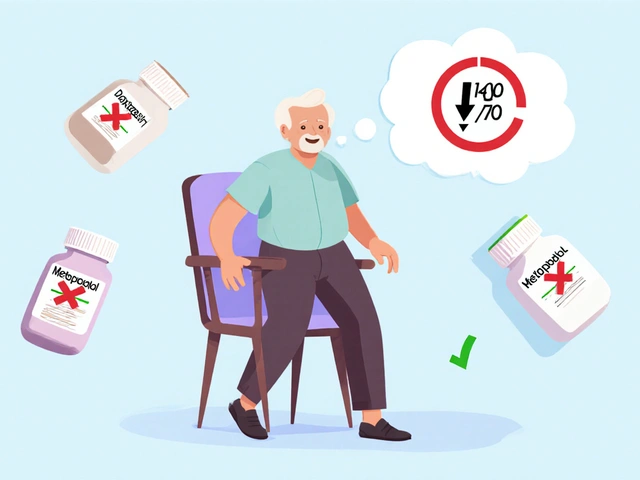
If you've ever scrolled through birth control options and felt overwhelmed, you're far from alone. Yasmin stands out from the pack, often getting praise for its effectiveness, but there are a bunch of questions swirling around it—what exactly does it do, who should use it, are the side effects worth it, and are there any unexpected upsides? Let’s unpick the reality behind the little pill that’s been around for over two decades, without sugar-coating the details.
What Exactly Is Yasmin and How Does It Work?
Yasmin isn’t just another pill in the sea of contraceptives. It’s what doctors call a combination oral contraceptive—meaning it blends two female hormones, ethinyl estradiol and drospirenone, wrapped up inside a single daily tablet. The science behind Yasmin is surprisingly straightforward. These hormones stop ovulation—no egg, no baby. But Yasmin does more than that. It also changes the cervical mucus, making it trickier for sperm to meet an egg, and tweaks the lining of the uterus, so even if a fertilized egg showed up, it’d have a tough time settling in.
Even though Yasmin came on the market in 2001, it’s the drospirenone in the mix that sets it apart from earlier birth control pills. Drospirenone acts a bit like a water pill (diuretic), so women often notice less bloating and sometimes even clearer skin. Convenient, right? The standard Yasmin pack comes with 21 active pills and 7 placebo pills—those last seven don’t have hormones but help you keep the habit going day to day. If you’re not regular with your routines, those placebo pills can be a real lifesaver.
Now for a little data: Clinical trials show Yasmin is more than 99% effective when taken perfectly—meaning at the same time every single day. Sure, real life isn’t always perfect, which brings the effectiveness down to around 91%. That’s still pretty good odds, especially when you compare it to relying on luck and wishful thinking. Here’s a quick table with how Yasmin stacks up to other types:
| Method | Typical Use Effectiveness |
|---|---|
| Yasmin (pill) | 91% |
| Male condom | 82% |
| IUD | 99%+ |
| Withdrawal | 78% |
One thing people forget is that Yasmin won’t protect against sexually transmitted infections (STIs). Condoms, dental dams, or abstinence are your go-to for that job. Yasmin’s superpower is in managing pregnancy risk—and it’s pretty efficient at that.
Benefits Beyond Birth Control: Why Women Choose Yasmin
Sure, Yasmin is a go-to for dodging pregnancy, but for plenty of women, the perks don’t stop there. If you’ve ever struggled with heavy periods, Yasmin might be game-changing. A lot of women report lighter, more predictable cycles after a few months. If you get cramps that make you cancel weekend plans, Yasmin often takes the edge off period pains. That’s not marketing hype; researchers have tracked these effects through multiple studies, including a well-known 12-month trial where more than 60% of users said their menstrual cramps improved.
And if acne’s been driving you up the wall, Yasmin’s your friend here too. Thanks to that drospirenone, Yasmin tackles testosterone, a hormone that triggers breakouts. The result? Fewer pimples, less oily skin, and sometimes a total game-changer for people struggling with hormonal acne. It doesn’t turn your face into an airbrushed selfie, but a lot of women say it made them less self-conscious about their skin. Dermatologists even prescribe Yasmin off-label for stubborn acne, especially when other treatments flop.
Let’s talk mood. Not everyone feels this, but some people say Yasmin levels off those wild mood swings that roll in before your period. Unlike some older pills that can spark PMS symptoms, Yasmin’s specific hormone blend seems to help some users feel a bit more even-keel. Of course, responses vary wildly, and you won’t know till you try it. A few even find relief from symptoms of polycystic ovary syndrome (PCOS), such as irregular periods or excess hair growth, making Yasmin a two-birds-one-stone kind of pill for these cases.
A lesser-known bonus—Yasmin may help prevent ovarian cysts. It’s not a “guaranteed never get them again” deal, but evidence shows a reduced risk compared to no hormonal contraception. Plus, some large studies have linked the long-term use of combination pills like Yasmin to lower rates of endometrial and ovarian cancer. These aren’t reasons to start birth control by themselves, but they’re nice side-benefits if you’re considering your options.

Possible Side Effects and Risks: The Not-So-Fun Part
Okay, let’s talk side effects, because nobody likes being blindsided. Like any pill, Yasmin isn’t magic for everyone. Some people breeze through it with barely a blip. Others run into nausea, breast tenderness, or headaches in the first few days—usually, these fade as your body gets used to the hormones over a month or two. If you stick it out past the awkward adjustment phase, things often settle down.
The water pill effect that makes Yasmin unique can sometimes backfire, causing symptoms like increased urination or mild dehydration if you’re not drinking enough water. And, a small chunk of people (usually under 10%) find Yasmin makes them feel anxious or a little moody. A handful will see no change, some will feel way better, and a small group might feel worse. There’s no test to predict your reaction, so you need to pay attention to your own signals.
People love to ask about weight gain. Most studies say Yasmin, and combination pills like it, won’t pile on pounds for most people. Sometimes your weight might shift up or down a pound or two, but long-term studies don’t show a convincing link to real weight gain. The myth persists, but so does the science—it’s more likely to cause water balance changes than actual fat gain. You’ll want to watch for any swelling, though, especially in your legs or around your ankles, just in case.
There are also bigger risks—rare, but real—like blood clots, stroke, or heart trouble. The drospirenone in Yasmin has been linked in some reports to a slightly higher risk of blood clots than older pills (like those with levonorgestrel). For most healthy young women, that risk is low—up to 9 cases per 10,000 women per year, compared to 5-7 per 10,000 on other pills, and much higher (20-30 per 10,000) during actual pregnancy. High blood pressure, smoking, migraines with aura, or a family history of clotting disorders stack the odds against you, and your doctor will want to know all of that before writing a prescription.
If you notice sudden leg pain, chest pain, or trouble breathing, that’s a red flag to see a doctor right away. Most people will never experience these risks, but it’s good to stay aware. There’s a balance to strike: the convenience and side perks versus those rare but real safety concerns.
Tips for Taking Yasmin Effectively
Here’s where Yasmin asks for your teamwork—take it same time, every day, no skipping. Set a reminder on your phone or sync it with a daily habit, like brushing your teeth. Missing a pill can throw the whole effectiveness thing off. If you miss one pill, take it as soon as you remember, even if that means two in one day. Miss two or more? The risk jumps, and you’ll need backup birth control (think condoms) for at least a week while your system recalibrates. The information leaflet gives detailed backup instructions, or just call your pharmacy if you’re not sure.
Keep a spare pack around for travel or bad weather days when getting to the pharmacy is tricky. If you have digestive troubles—like vomiting or diarrhea right after you take your pill—it can also affect how well it works. The hormones might bail from your system too fast, so use a backup until you’re back to normal for at least 7 days.
Certain medicines, like antibiotics for tuberculosis (not the usual antibiotics for sinus infections) and epilepsy treatments, can lower the pill’s effectiveness. Always mention you’re taking hormonal birth control if you get prescribed something new. St. John’s Wort—an herbal supplement people sometimes use for mood—also messes with Yasmin’s effectiveness. Don’t take chances with it. Your pharmacist will know the up-to-date details, so it’s always worth checking in.
A lot of people ask, “Can I stay on Yasmin for years?” Studies and big health organizations agree it’s safe for most healthy women to use Yasmin for years, as long as you’re regularly checking in with your doctor and watching for new risk factors. Your provider might run annual blood pressure checks and ask you about leg pain or headaches—routine stuff to keep things safe.

How Yasmin Compares to Other Birth Control Options
With so many choices—patch, ring, implant, IUD—how does Yasmin hold up? People choose Yasmin for its steady routine, positive effects on skin and periods, and the feeling of control it gives. Pills like Loestrin, Yaz, or Microgynon use different blends of hormones but act very similarly. Some pills use a lower or higher dose of estrogen, which can tweak your side effect profile. Yasmin’s estrogen dose is moderate, so it tries to split the difference: good cycle control, not too many hormone side effects.
Compared to the patch or ring, Yasmin is more hands-on but less visible—no sticky patches, no insertion. If you’re the forgetful type, a long-acting method like the IUD or implant might remove a lot of the mental load. On the flip side, if you like the ability to stop and start on your schedule—like if you decide you want to get pregnant next year—Yasmin’s flexibility is a clear win. Anticipating regular periods and knowing when your next period will land can be a big comfort if you’ve had surprise cycles before.
Cost-wise, Yasmin sits in the middle of the pack. With insurance in the U.S., co-pays are modest, and some plans cover it in full. Without insurance, Yasmin can run $30-50 per pack, but there are generic versions (like Ocella or Gianvi) that keep costs down. Always ask your pharmacist for the generic; it’s the same active stuff at a lower price point.
Some people can’t use estrogen-based pills at all—if breastfeeding or have a history of clots, Yazmin won’t be an option. The progestin-only “mini pill” or non-hormonal methods might work instead. It’s never one-size-fits-all. If Yasmin’s not for you, don’t sweat it; there are at least a dozen different options to match your health, schedule, and preferences. The key is honesty with your provider so you get a plan tailored to you.




Jocelyn Hansen
July 18, 2025 AT 14:45Omg, I’ve been on Yasmin for a while now and honestly, it’s been such a game changer!!! 😍 Not only does it help me keep things under control, but I noticed my skin actually got clearer which was a total bonus!!
Also, side effects? Yeah, I had some minor headaches in the beginning but nothing crazy. The benefits totally outweighed any small issues. Plus, the guide here really nails the part about sticking to a routine — seriously, don’t mess that up or you’ll throw off your cycle.
Anyone else here have an experience with Yasmin? Would love to hear what worked or didn’t for you! It’s so reassuring to see all the info put out there because sometimes it feels like a mystery pill you just start taking.
Julie Sook-Man Chan
July 19, 2025 AT 17:46I appreciate this comprehensive overview of Yasmin. It’s important to weigh both benefits and side effects before deciding on a birth control option. From my own experience, I found that the hormonal balance Yasmin offered was effective, but the side effects varied widely over time.
This post encourages me to keep a proactive approach to managing any discomfort, especially since it mentions some surprising health perks I hadn’t considered.
Does anyone have tips on how to mitigate the common side effects when starting on Yasmin? Any tricks that have worked well would be greatly appreciated.
Amanda Mooney
July 22, 2025 AT 01:20This is a thorough and enlightening guide on Yasmin. While the contraceptive aspect is well known, it is quite refreshing to see the focus on holistic health benefits and the nuances of its effect on different individuals.
It is essential to approach birth control with an informed mindset, and I commend the clarity here regarding expectations and comparisons with other available options.
Does the author have any insight on long-term wellbeing and any clinical studies supporting these benefits? I believe that information could further empower readers to make educated decisions.
Cinder Rothschild
July 24, 2025 AT 08:53I find it fascinating how something so common as a birth control pill could have layers of impact beyond just preventing pregnancy. The cultural narratives often simplify it to 'just a pill,' but this piece showcases it as a complex, multifaceted health tool.
That said, I've heard from friends that side effects can vary tremendously depending on background and lifestyle. It’s crucial to keep that in mind rather than look at it as a universal solution.
Would love to see more discussion on how different demographics experience Yasmin differently. Anyone from more diverse backgrounds here willing to share their personal stories?
Oscar Brown
July 25, 2025 AT 15:26Permit me to interject, for one's apprehension pertaining to the pharmacodynamics of Yasmin must be met with an exercising of both caution and erudition.
The nuances of its hormonal interplay — the ethinylestradiol and drospirenone combination — warrant a closer inspection, to understand both therapeutic efficacy and potential adverse outcomes.
It behooves any user or prescriber to consider contraindications with diligence. The post does an admirable job delineating expected effects but a more exhaustive exposé on biochemical mechanisms would enrich the scholarly conversation.
Kevin Cahuana
July 28, 2025 AT 12:53I like how this guide balances practical tips with the medical facts. Sometimes these topics get too dry or too alarmist, but this post keeps everything measured.
It’s great to see acknowledgment that side effects can be different for everyone and that no one size fits all when it comes to birth control.
If anyone is starting Yasmin, my advice is to keep a journal of how you feel, mood-wise and physically, for at least a couple of months. It helps catch patterns early, and sharing that with your doctor can really inform your care plan.
Ajay Kumar
July 31, 2025 AT 20:03Thanks for sharing this guide! It is really informative, especially for those new to birth control pills.
In my experience discussing with friends from India and elsewhere, sometimes cultural misconceptions create reluctance to use hormonal birth control. Having clear, factual information like this helps to dispel myths.
Also, the mentioning of health perks beyond contraception was surprising to many I spoke with. It broadens the perspective on what these medications can do.
I'm curious if there are any localized guidelines or considerations for usage based on geography or ethnicity?
Artie Alex
August 3, 2025 AT 18:53This post glosses over some of the darker sides of Yasmin that deserve more outrage. The so-called 'surprising health perks' ring hollow when juxtaposed with the serious side effects that are often minimized.
Trust me, the barrage of clinical jargon is no substitute for lived trauma from adverse reactions – those blood clot risks, depression, and hormonal havoc wreaked on unsuspecting users.
The glorification of benefits is a classic trope to mask the insidious chemical manipulation that these drugs impose. I urge everyone to approach with extreme skepticism.
nalina Rajkumar
August 5, 2025 AT 01:26This is a useful post :) thanks for sharing
i really liked how it covers both benefits and side effects not just promoting like others do
i started Yasmin few months ago fortunately didn’t get any major side effects so far 😅
Hope tips mentioned will help many others too 😊
Natalie Kelly
August 10, 2025 AT 00:53Thanks for the detailed info, super helpful! I’ve always been a bit anxious about birth control pills because of the side effects, but this guide makes it look more manageable.
Really appreciate the straightforward tips for using Yasmin effectively. It’s easy to overlook things like timing and consistency but they make a huge difference.
Would love if next time you could share some personal stories or FAQs. That would be super comforting for people new to this.
Nicola Strand
August 16, 2025 AT 01:20While the enthusiasm regarding Yasmin’s efficacy is commendable, one must not neglect the critical examination of its societal implications and ethical considerations.
Unquestioning acceptance of hormonal contraceptives without addressing potential coercive pressures and the medicalization of normal female physiology contributes to a problematic discourse.
It is imperative that any discourse on birth control includes an analysis of autonomy and informed consent beyond mere pharmacological function.